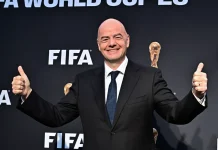The 2026 FIFA World Cup which is to be held in the United States, Canada, and Mexico jointly is an unprecedented expansion in size and vision. It also comes at a time when the mobility of the world is being punished by tension due to geopolitical situations and the stringent border regulations. Although FIFA committed to aligning with the UN Guiding Principles on Business and Human Rights, it has been widely criticised regarding whether it can apply these principles now that visa policies are starting to act as a barrier to the involvement of both players, fans, broadcasters, and other sports personnel in multiple countries, including the United States of America.
According to reports made by civil society organizations, even individuals who belong to countries including Iran, Cameroon, and Colombia are already being hindered by the delays in issue of visa and visa denials. In their critique of 2025, Human Rights Watch singled out instances of whole fan delegations and even support staff experiencing visa delays running into hundreds of days. Such barriers are directly opposed to the publicly declared mission of FIFA to ascertain non-discrimination and equal access by everyone who supports the global world of football.
The Impact On Fans, Players, And The Spirit Of Football
Barriers To Entry For Key Groups
Visa restrictions are not mere technicalities—they cut directly into the connective tissue of the tournament. A World Cup thrives on the physical and emotional presence of global audiences. The long queues facing appointments to get the visas or reportedly 700 days in Colombia, 560 in Turkey, and more than 300 in Morocco keep away thousands of prospective attendees. Bans of players of certain nationality to travel in the name of security as well as in the name of politics as well bring the issue of awarding qualification based on merit and fanhood of all countries into question.
To coaches and athletes, the delays may pose a risk to physical preparation, cohesion, and mental well-being. To the fans and the volunteers, it brings a form of uncertainty, which casts a negative effect on the months or even years of preparation and expectations.
Discriminatory Impacts On Vulnerable Groups
The transgender and non-binary candidates are especially subjected to extra vetting within the scope of some U.S. visa rules, which involve revealing sex assigned at birth. Such practices do not only risk people, but they are also against the inclusion policies of FIFA. There have been some reports, also, of rejections of visa applicants, depending on their political opinions or their usage of the social media, which is alarming as far as freedom of expression and profiling.
The combined effect is a chilling environment for global participation in an event that is marketed as borderless and inclusive. In June 2025, FIFA’s correspondence with human rights organizations acknowledged these concerns but committed only to general dialogue with host nations—far from the robust action many had anticipated.
Broader Human Rights Risks Embedded In Host Country Policies
Discriminatory Immigration Controls And Detention Risks
In addition to access, general immigration enforcement policies in the U.S. increase the dangers of the targeted population. Due to new executive orders that referenced the Alien Enemies Act, immigration raids and additional border screenings have predominately targeted people flying into the country out of Muslim-dominated countries. The game ethnicities do not have such a privilege; even though officially the players are off-limits to the rules of the World Cup, still other players, such as media, technical personnel, and family, are still vulnerable to exclusion.
Travel plans of most people have been changed due to the fear of arbitrary immigration practices where detainees are subjected to humiliating procedures at borders. There are instances when athletes did not take their family members to avoid issues met at entry points. These punishments contradict the purpose of FIFA that is unity and celebration in the field of sport.
Policing And Freedom Of Expression Concerns
There have also been red flags by human rights observers of anticipated surveillance and limitation of peaceful protest or free speech. Considering the security environment of high alert in the United States, anyone who voices opinions that are unfavorable to the host country policies (in the areas of human rights, immigration or foreign policy) is at high-risk of being monitored. This conflict endangers the stated priorities of FIFA that promotes freedom of expression of different and respectful debates about the international sporting events.
Policies which disrupt unopposed conglomeration or expressive behaviour risk converting World Cup centers into sterilised regions without the impelling cultures greatest and soundness that purport to be a defining highlight of the tournament. When the places that should be used to bond, are those full of fear or suppression it undermines the essence of the event.
FIFA’s Role And Responsibility Amid Emerging Challenges
FIFA’s Commitments And Strategic Gaps
To curb the negative effects, FIFA has developed a human rights regime over the 2026 world cup based on international norms and asking host countries not to adversely affect them. It is written as the 2026 Bidding Process Guide that requires the co-hosts to uphold labor rights, freedom of expression, and non-discrimination in any activities pertinent to the tournament.
However, critics point out the gap between policy and practice. FIFA’s response to Human Rights Watch in June 2025 lacked concrete steps, offering instead to monitor “known” issues. No enforcement mechanism or escalation pathway has been made public, prompting concerns about accountability and follow-through.
The Need For Institutional Leadership
Civil society coalitions such as the Sport & Rights Alliance are now calling for FIFA to publicly advocate for policy adjustments. This includes pushing for expedited visa processing for all officially affiliated personnel and ensuring fans from all nations can safely enter host countries. The absence of such demands risks normalizing discriminatory access, contradicting FIFA’s own values.
Minky Worden, director of global initiatives at Human Rights Watch, recently remarked that FIFA must
“publicly acknowledge the threat US immigration and other anti-human rights policies pose to the tournament’s integrity”
and urged the organization to set “clear benchmarks and timelines for the US policy changes needed to ensure respect for immigrants’ rights.”
When we say South Africans generally respect other countries’ laws & they travel with valid passports and permits.
This is why we will never understand why people don’t want to return our goodwill not come to our country illegally.There’s no single South African that has… pic.twitter.com/45VTzP9RqQ
— Kwena Molekwa (@Miz_Ruraltarain) January 20, 2025
Governance And Enforcement Gaps
Loopholes In FIFA’s Accountability Architecture
The lack of binding enforcement tools within FIFA’s governance framework allows state policies to override its commitments. In the tri-national context of the 2026 World Cup, policy harmonization among the U.S., Canada, and Mexico becomes even more critical—but also more difficult. In the absence of a centralized oversight body with legal teeth, FIFA’s reliance on informal diplomacy may prove insufficient.
The June 2025 FIFA update, which lacked deadlines or threat of sanction, underscored this institutional fragility. It left unanswered whether repeated rights violations would affect a host nation’s future eligibility or FIFA’s internal assessments.
Risks To FIFA’s Global Legitimacy
As the international steward of football, FIFA’s credibility depends on its ability to ensure that global tournaments reflect shared values. If fans and players are treated disparately based on nationality, identity, or belief, FIFA risks transforming its flagship event into a symbol of division rather than unity. The 2026 World Cup is a high-profile test of whether football can be both global and just.
The Stakes For Football And Global Inclusion
Social Cohesion And Public Trust
The 2026 tournament is expected to welcome over 6.5 million attendees. Ensuring equitable access is not just a logistical matter but a foundational requirement for building social trust. When certain groups are excluded or made to feel unwelcome, it undermines the broader legitimacy of the event.
The long-term risk is that alienated communities may withdraw from global football culture altogether. For many, the World Cup represents more than sport—it is a rare moment of cultural convergence. Losing that opportunity due to opaque or discriminatory visa regimes harms the entire ecosystem of the game.
Lessons From Past Tournaments
The history of the World Cups has shown how failures in human rights, be it labor exploitation by companies or censorship, can change the general attitude forever. The 2026 version thus is not just the one to glory upon who will be the victor at the pitch, but also on how access, dignity, and equality is preserved, off the pitch.
Provided that FIFA rights framework remains aspirational but not enforced, subsequent hosts will also be likely to do the same and begin the precedent that profit and politics should take precedence over people.
A Defining Moment For FIFA And Global Sport
The shifting visa requirements prepping up to the 2026 World Cup throw a light on a deeper issue: how to balance the sovereign power to control immigration with the universal quality of sports. The World Cup as a very concept, presupposes common humanity and crossing the borders. When that ideal is blocked at checkpoints and embassies, the ideal of the tournament is destroyed.
FIFA finds itself at the crossroads. It can opt to be a stronger force in human rights, use its weight to influence policy and defend its members, or it can suffer the national policies to water it down. Its subsequent actions, both on the field and backstage, will become only a precedent not only in this tournament, but also in the future development of international sport as a territory between inclusion, freedom, and world solidarity.













